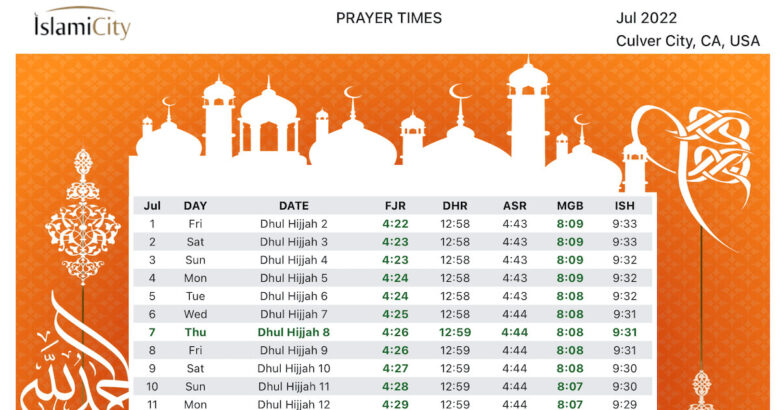Prayer is an integral part of many religions worldwide, symbolizing a connection between the divine and humanity. For Muslims, prayer, known as Salah or Salat, is a cornerstone of faith, observed five times a day at specific times. These prayer times are meticulously calculated based on the position of the sun, emphasizing the connection between spirituality and the natural world. This article explores the importance of prayer times, the method of calculation, and their significance in daily life.
The Spiritual Importance of Prayer Times
In Islam, the five daily prayers are not just acts of worship but moments of spiritual rejuvenation and connection with Allah. These prayers serve as a reminder of faith, discipline, and gratitude. Each prayer has its unique spiritual significance:
- Fajr (Dawn Prayer): Performed before sunrise, it signifies the start of a new day. Fajr is considered a time of great spiritual blessings, emphasizing hope and renewal.
- Dhuhr (Noon Prayer): Conducted after the sun has passed its zenith, this prayer provides a pause during the busiest time of the day to reflect and seek guidance.
- Asr (Afternoon Prayer): Performed in the late afternoon, Asr reminds believers of life’s fleeting nature and the importance of balancing worldly and spiritual pursuits.
- Maghrib (Evening Prayer): Offered just after sunset, it marks the transition from day to night, symbolizing gratitude for the day’s blessings.
- Isha (Night Prayer): Conducted in the evening, Isha offers tranquility and a chance to seek forgiveness and peace before resting.
The Calculation of Prayer Times
Prayer times are based on the movements of the sun and vary daily and by location. Understanding how these times are calculated enhances one’s appreciation for their precision and connection to nature.
- Fajr (Dawn): This time begins when the first light appears on the horizon, known as the “astronomical twilight,” and ends just before sunrise.
- Dhuhr (Noon): Starts when the sun crosses its zenith, transitioning from morning to afternoon. It ends as the sun begins its decline.
- Asr (Afternoon): The timing of Asr varies slightly between Islamic schools of thought but generally begins when the shadow of an object is equal to or twice its length, depending on interpretation.
- Maghrib (Sunset): Begins immediately after sunset when the sun is no longer visible below the horizon. This is a short window of time for prayer.
- Isha (Night): Starts when the twilight has disappeared, marking complete darkness.
Advanced tools and mobile applications have made it easier to determine accurate prayer times, taking into account local coordinates and variations in sun positioning.
The Role of Prayer Times in Daily Life
The discipline of observing prayer at specific times fosters a structured and balanced lifestyle. Adhering to these schedules requires time management, encouraging believers to plan their day around moments of worship. This practice has both spiritual and practical benefits:
- Spiritual Benefits: Regular prayers instill a sense of mindfulness, gratitude, and peace, anchoring believers in their faith regardless of life’s challenges.
- Health Benefits: The physical actions involved in Salah, such as bowing and prostration, promote flexibility and improve blood circulation.
- Mental Focus: Taking deliberate breaks to pray allows individuals to step away from stress, refocus, and return to tasks with renewed energy.
Global Variation in Prayer Times
Due to the Earth’s axial tilt and rotation, prayer times vary significantly across the globe. Countries closer to the equator experience relatively consistent timings year-round, while those further away, such as in polar regions, face unique challenges. For instance:
- In Polar Regions: During summer and winter months, the sun does not rise or set for extended periods. In such cases, Islamic scholars recommend following prayer times of the nearest city with normal day-night cycles or using standard times like those in Mecca.
- Seasonal Changes: In most regions, prayer times shift slightly each day, with significant differences between summer and winter schedules.
The Role of Technology in Modern Prayer Practices
Advancements in technology have revolutionized how Muslims track and observe prayer times. Smartphone apps, online tools, and digital azan clocks provide real-time updates, ensuring accuracy and convenience. These tools also accommodate variations in Islamic interpretations and geographical factors, making them widely accessible.
Some popular apps include:
- Muslim Pro: Offers comprehensive features, including accurate prayer times, Qibla direction, and Quran recitation.
- Athan: Provides prayer alerts and mosque locator functions.
- Salaat First: Focuses on simplicity, offering precise prayer times with minimal distractions.
Significance Beyond Worship
While the primary purpose of prayer times is spiritual, they also foster a sense of unity among Muslims. The synchronization of millions of believers worldwide, bowing in prayer at the same time, underscores the universality of Islam. Additionally, prayer times encourage environmental awareness, reminding Muslims of the sun’s role in sustaining life and marking the rhythm of time.
Conclusion
Prayer times are more than just moments of worship; they are a reflection of faith, discipline, and the intricate harmony between spirituality and nature. They guide believers in structuring their day, maintaining mindfulness, and connecting with the divine. Whether you are in a bustling metropolis or a remote village, the call to prayer transcends boundaries, uniting Muslims in devotion and gratitude.
By understanding and embracing the significance of prayer times, individuals can deepen their spiritual journey, aligning their lives with the rhythm of nature and the principles of faith.




